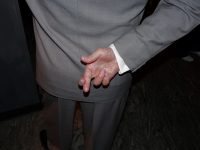What Happens if I make a False Statement to Police or in Court?

The reasons for making a false statement to police or in-court are varied: a person may be trying to protect themselves or someone else, or they may be attempting to seek ‘victim’s compensation’, or they may even be trying to get someone else into trouble or gain an advantage over them.
But the law has this area pretty-well covered, and there can be serious penalties, even if you lied for the very best of motives.
Lying during a criminal investigation is known as perverting the course of justice, which carries a maximum penalty with 14 years imprisonment.
Under the NSW Crimes Act, several offences fall under the category of perjury or false statements.
Perjury occurs when a person intentionally makes a false statement – but importantly, making an honest mistake is not an offence.
Perjury is not just limited to a defended hearing or jury trial – it can include things said in early court dates even before a hearing trial has started.
Anyone can be guilty of perjury whether they are the defendant, a witness or even police.
Perjury can be difficult to prove and usually needs strong evidence of a prior inconsistent statement (including a prior interview with police) or even a confession.
When dealing with police, your best option is normally to remain silent unless there is a very good reason to talk. It is usually not a good idea to participate in a police interview unless you have received advice to do so from an experienced criminal lawyer.
There are some situations, however, where you do not have the right to silence.
These include when you are being asked by police for identification if they suspect that you may have just committed a crime, or that you may be able to assist in the investigation of a crime. This applies as well as if you are the driver of a motor vehicle.
If you are not the driver or owner of a vehicle and police ask you to give any information that you might know about the driver’s identity or address, you have every right to remain silent.
Am I guilty of perjury if I change my plea?
Changing your plea from not guilty to guilty is not going to open you up to criminal proceedings.
However you may lose out on some of the advantages that could have been gained if you had pleaded guilty earlier on, such as sentence reduction.
What if I make false accusations against someone?
Making false accusations is treated very seriously by the courts.
Accusing someone else of a crime you know they have not committed in order to lead to an investigation attracts a maximum prison sentence of seven years.
AVOs are one are of the law where false accusations are frequently made.
While not all unsubstantiated AVOs are done vindictively, some people unfortunately try to get an AVO put out against a former partner, friend or landlord for revenge or to seek an advantage in child custody disputes.
Making a false AVO became a criminal offence last October, and carries a maximum penalty of 12 months imprisonment and / or a fine of up to $1,100.
This does not apply if a person is genuinely mistaken – they must have known that their statement was false when they made it.
What is witness immunity?
If you have been called as a witness to court but are scared to tell the truth in case you end up incriminating yourself, you may be able to benefit from witness immunity.
In some circumstances, you may be able to give truthful evidence that will not be allowed to be used against you.
Witness immunity protects people from self-incrimination.
You may object to a particular question being asked on the ground that answering might tend to prove you committed an offence.
If so, a magistrate or judge will need to decide whether or not you will be required to answer the question.
In some cases, this means you may not need to answer the question at all, and in other cases you may be required to answer the question but any evidence you give will not be allowed to be used against you in any future proceedings.
Receive all of our articles weekly
Author






